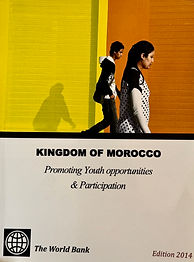Our Mission
GLC Global Consulting’s mission is to advise private, non-profit and governmental clients with solutions that bring together strategic, conceptual and practical solutions in sustainable development, with a focus on social and economic resilience, education and training, employment, entrepreneurship, financial inclusion, infrastructure, design and construction management.
Our Story
Gloria La Cava founded GLC Global Consulting following 26 years at the World Bank Group (WBG). During her tenure at the WBG, she served as Advisor at the Board of Directors with a large portfolio covering human and socio-economic development as well as environmental issues.
Ms. La Cava held advisory roles in large WBG funds, including the Japanese Social Development Fund and the State and Peace Building Fund (with an overall value of over USD 700 million).
As a WBG senior staff, she designed programming for regions affected by fragility and conflict, putting in place preventative and recovery approaches in Africa, Middle East, Europe and Central Asia.
She pioneered integrated youth development as a key investment area and was responsible for designing, financing and managing programs that lifted tens of thousands of youth and women out of poverty, unemployment and inactivity in countries across these regions.
Publications
Strengthening Youth Resilience to Radicalization: Evidence
from Tajikistan (WBG, 2020)
This study was prepared in the context of the World Bank Group Strategy for Fragility, Conflict and Violence 2020-2025 which underlines the importance of preventing violent extremism as it displaces people from their homes, destroys infrastructure and livelihoods and diverts financial resources from service delivery to security. The study examines the youth, gender and local dimensions of radicalization and recruitment, identifying the more at-risk groups and geographical areas. It presents comprehensive development approaches to strengthen youth resilience to radicalization ranging from education curricula reform, extra-curricular activities, livelihoods and entrepreneurship support, to interventions for resilient mindsets, such as soft and critical thinking skills, mentoring and psychosocial support.
Youth as Agents of Peace: Somalia (WBG, 2018)
This joint country study was conducted by the United Nations and the World Bank in line with the principles of the UN Security Council Resolution 2250 through local engagement with young people, parents, and their communities in one of the most fragile and conflict-ridden areas of the African continent. Against a backdrop of continued conflict, insecurity, and violent extremism facing Somalia, the study offers a positive vision for defining peace as articulated by young women and men. It concludes by offering a multidimensional operational framework for supporting youth and specifically addressing the unique needs of young women through various measures including (a) development of skills, competencies and peace education, (b) support for livelihoods, entrepreneurship and innovation, as well as (c) meaningful engagement in governance at all levels.
Tunisia: Breaking the Barriers to Youth Inclusion (WBG 2014)
The study provides an analysis of the aspirations and needs of young Tunisians, taking into account both non-economic and economic measures of exclusion that were at the root of the Arab Spring revolution that started in Tunisia. It included study of the rising youth activism outside formally established political institutions as well as the need to support the transition of Tunisian youth from protest to active citizenship. Young people who were not in education, employment, or training (NEET) was the category most affected by economic exclusion The study recommends ways to mitigate these factors.
Kingdom of Morocco: Promoting Youth Opportunities and
Participation (WBG 2012, Edition 2014)
Prepared just prior to the Arab Spring, the report anticipates the demands for social and economic inclusion articulated by Moroccan young people especially following February 2011. The study focuses on youth, aged 15-29 who make up 30 percent of Morocco’s total populatin and 44 percent of the working age population. Two areas of focus were 1) promoting employability with linkages to labor markets and entrepreneurship and 2) active youth participation in the programs and designing youth policies.
Albania: Filling the Vulnerability Gap (WBG 2000)
This report describes the social fragmentation in Albania in the years following the fall of communism, offering a series of proposals to stabilize the country and help strengthen its social capital. Examination of the transition in Albania identified at least seven most vulnerable groups. The report proposes a group of measures to address vulnerability underpinned by a strategy to enhance social capital at local and community levels. The key measures identified in this study include regional targeting to offset different degrees of vulnerability, targeting of vulnerable groups in the areas where they are especially concentrated, designing multipurpose programs, such as community development and social service delivery, that address the needs of vulnerable groups and add value to existing community resources. The identified measures also include the engagement of local actors who operate beyond the logic of familism or kinship in order to strengthen bridges with vulnerable groups that have weaker social links as well as nongovernmental organizations with local roots.






